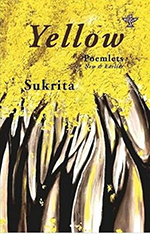While prose describes, poetry suggests, is how the saying goes. What remains unsaid in poetry is much more significant than what has actually been said. The best of poems are filled with such eloquent silences, in between the words, much like music in the gaps between two notes. Sukrita’s poemlets do just that in her book of poetry, Yellow: Poemlets New & Earlier. Far beyond the explicitness of meanings, her poemlets evoke feelings. Her poemlets have layers to them, to be unravelled by the discerning readers of poetry, like the proverbial ‘onion’ to be peeled layer after layer only to realize that each layer is actually an onion unto itself, and if there is something called the onion, it always exists elsewhere, inside the mind. Thus, all the poemlets in this collection celebrate the eternal ‘elsewhereness’ of meaning. The reader is ushered into a dreamscape of sorts, where the poems carry a certain weight of calmness in them, alongside a feather-like touch of profound lightness:
silence is a vertical line
that runs through the spine
all energy rises from there
silence is the stillness of the universe
all movement evolves from there
– Silence
Poemlets such as this actually prod us to see and seek beyond the obvious; urge us to long for yet another realm of experience which is endearingly esoteric and other-worldly, leaving in us a lingering sense of calmness, a pause, a sense of containment.
Sukrita knows the fine art of carving out the extraordinary from the mundane. There are poemlets that leave you to reflect, anticipate and ruminate; they put you in a fix, coax you to visualize and feel deeply:
I see her now
only when I close my eyes
on the screen that is dark
illuminated by her appearance
not so randomly
Such poems don’t lead you to a ‘deterministic’ meaning, rather they allow the reader to explore and find his/her own. The poet lets the reader embrace them as his/her ‘own’ poemlet. It’s as if the poet is side stepping, allowing the reader to take over and participate in the process of building up of a poem while reading it. It is both creative and courageous on her part to use a Hindi word ‘Gufa’ as the title of a poemlet when she articulates:
womb is a natural gufa
of creation
and it’s a tomb
of all memories
– gufa
Sukrita is never apologetic about the size of the poems, rather proclaims that ‘small is beautiful’, where meaning lies compressed in words that are few; which unfold their complexity gradually like a new-born baby slowly unravelling its wisdom stored in genes to flourish over time. ‘More words create more noise,’ the poet asserts. Small in size but teeming with emotions, packed with thoughts, much like a can of condensed milk, these poemlets are actually ‘thought-pulps’ to be tasted with the aesthetic tongue of the mind, like:
the newspaper reads well
when
nothing is happening:
the dewdrop swallows the sun
and
leads a colourful existence:
the barking of the dog
gives meaning to
the silence of the night
– meaning
No wonder, poemlets such as these don’t say much but do suggest a lot. Not being verbose, they sit light on the mind and heart of the readers, but seem powerfully eloquent in their overall import:
words as frozen ice
stuck in the
throats
of lovers
– breaking silence
The poemlets in Yellow act like a door held open to a grand vista of liminal spaces that lie in between the said, unsaid and the unsayable; in between the real and unreal; and revel in their apparent inconclusiveness. As they say, a poem is never completed; rather, abandoned. Carrying a certain arcane elegance, Sukrita moves around such spaces with a flaneur gaze, a keen eye that records the ‘interiority’ of things, containing in them a zen-like quietude, a stillness that lies between the words. As she writes in her introduction, ‘Silence is the movement between one note and the next..’. May the ‘silences’ in her poemlets grow spatially, in their fantasmagoric immensity.
Durga Prasad Panda is a bilingual poet and critic.

